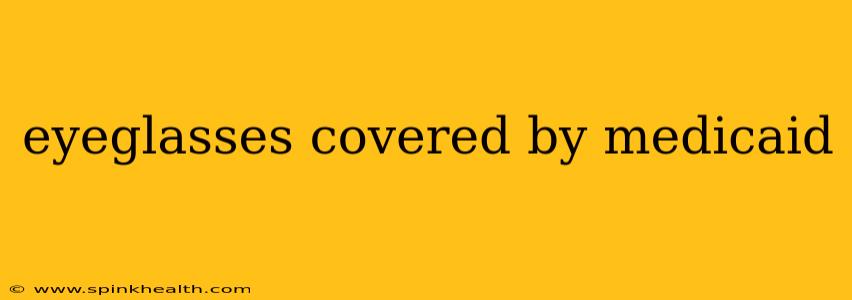Navigating the world of healthcare coverage can be a maze, especially when it comes to specific benefits like eyeglasses. Many people wonder, "Does Medicaid cover eyeglasses?" The answer, thankfully, is often yes, but it's not a simple yes or no. Let's unravel the complexities and provide you with a clearer picture.
My name is Sarah, and I've spent years working within the healthcare system, witnessing firsthand the challenges people face accessing essential services. This experience has fueled my passion for providing clear, accurate information to help individuals navigate these systems effectively.
The truth is, Medicaid coverage for eyeglasses varies significantly depending on your state and specific Medicaid plan. There's no single, nationwide standard. Think of it like this: Medicaid is a federal program, but each state administers its own Medicaid program, tailoring benefits to its unique population needs and budget. This means one state might offer comprehensive vision coverage, while another might have more limited benefits.
What Does Medicaid Typically Cover?
Generally, Medicaid aims to provide basic healthcare necessities, and for many, that includes vision care. While the specifics vary, most Medicaid plans will cover:
- Eye exams: These are crucial for diagnosing vision problems and determining the need for corrective lenses. The frequency of covered exams might be limited (e.g., once a year).
- Eyeglasses or contact lenses: This is where things get more nuanced. Many states do provide coverage for eyeglasses, often with limitations on cost or style. Some might cover only the basic frames and lenses. Others may have a set dollar amount they will reimburse, requiring you to pay the difference for more expensive options. Some might prioritize children's vision care, providing more comprehensive coverage for young beneficiaries.
Does Medicaid Cover Eye Exams for Adults?
Yes, in most states, Medicaid does cover eye exams for adults. However, the frequency of these covered exams might be limited to once a year or even less frequently, depending on your state's specific plan and your individual needs. It's always best to confirm this with your specific Medicaid provider.
Does Medicaid Cover Eyeglasses for Children?
Again, the answer is generally yes, but with important caveats. Many states recognize the importance of early vision care for children and provide more comprehensive coverage for eyeglasses for this age group compared to adults. This increased coverage often includes a wider selection of frames and lenses. However, it’s still crucial to verify the specific details with your state's Medicaid agency.
How to Find Out if Your State Covers Eyeglasses
The best way to determine what your Medicaid plan covers is to contact your state's Medicaid agency directly. Their website will typically have a detailed benefit guide or a phone number for inquiries. Don't hesitate to ask specific questions about coverage for eye exams, eyeglasses, and contact lenses. You can also contact your doctor's office; they often have experience navigating Medicaid's coverage specifics in your area.
What if My Medicaid Doesn't Cover Eyeglasses?
If your Medicaid plan doesn't fully cover eyeglasses, don't despair. Several options may be available:
- Explore private vision insurance: Consider purchasing a supplemental vision insurance plan to cover the costs not covered by Medicaid.
- Look for low-cost vision providers: Many optical stores and vision centers offer affordable options for eyeglasses. Check for discounts and special offers.
- Contact charities and non-profit organizations: Some charities provide vision care assistance to low-income individuals.
Navigating Medicaid coverage for eyeglasses can be complex, but by understanding the nuances and taking the proactive steps outlined above, you can improve your chances of accessing the vision care you need. Remember, your proactive inquiry is the first step towards clearer vision!

